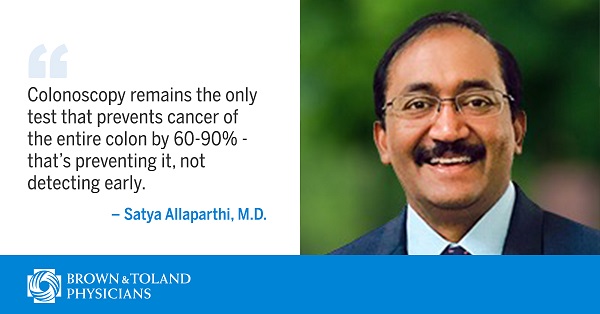Colorectal Cancer – The Facts About Screening, Prevention and More

Colorectal cancer is one of the most commonly diagnosed cancers in the United States — and the third most common cause of cancer deaths among men and women combined. About 100,000 cases of colon cancer, and just under 45,000 cases of rectal cancer, are diagnosed per year.
These cancers develop in the large intestine (colon and rectum), often from growths called polyps. Polyps are found in a third of all people. Initially benign, these growths may transform into cancer. In some cases, these cancers can become advanced or metastatic, breaking away from the large intestine to form new tumors elsewhere in the body. Although it is a very serious disease, colorectal cancer is preventable and can be successfully treated if detected early.
We recently sat down with Brown & Toland gastroenterologist Satya B. Allaparthi, MD, to discuss colorectal cancer risk and the most effective tool for its prevention and treatment – the colonoscopy.

What is a colonoscopy? Why are they important?
A colonoscopy involves looking at the colon from inside the body using a long, thin (about the width of your little finger), flexible tube called an endoscope. There is a tiny camera on the end of the tube through which the doctor can examine your entire colon and rectum for polyps or cancer.
If the doctor detects any polyps during a colonoscopy, he or she will remove them during the procedure. You do not feel when a polyp is removed and removing them does not affect recovery time. Removing polyps during a colonoscopy could stop colon cancer from growing or even cure it.
Who should be screened for colorectal cancer?
The U.S. Preventive Services Task Force (USPSTF ) recommends offering colorectal cancer screening starting at age 50 and earlier for African Americans (age 45). In fact, the American Cancer Society recommends screening for everyone beginning at age 45.
The risk of developing colorectal cancer (CRC) increases with age, with more than 90 percent of cases occurring in those age 50 or older. All men and women at average risk for developing (CRC) should have a colonoscopy every ten years.
Men and women should begin screening earlier and more often if they have any of the following CRC risk factors:
- A family history of CRC or polyps
- A known family history of inherited CRC syndromes
- A personal history of CRC or a personal history of chronic inflammatory bowel disease (ulcerative colitis or Crohn’s disease).
Why is it important to screen for colon cancer? Is the COVID-19 pandemic having an effect on screening?
Colon cancer is common and deadly; it affects both men and women equally. It is the third most common cancer in the United States. The lifetime risk for colorectal cancer is 1 in 20. Everyone is at risk if they live long enough – the most crucial factor is age.
Colon cancer is nearly entirely preventable, but 50 percent of eligible patients are not screened. To lower the chance of colorectal cancer, it is vital to get screened at the right time. “Any screening is better than no screening,” but colonoscopy remains the only test that prevents cancer of the entire colon by 60-90 percent — that’s preventing it not detecting early.
It’s important to note that a recent Lancet study (Feb. 2021) states that the COVID-19 pandemic caused a modest short-term disruption to colorectal cancer screening. This disruption will have a marked impact on colorectal cancer incidence and deaths between 2020 and 2050 attributable to missed screening. A post-disruption decrease in participation could increase colorectal cancer incidence by 0.2–0.9 percent and deaths by 0.6–1.6 percent between 2020 and 2050, compared with undisrupted screening. The American Cancer Society recommends to everyone that regular colorectal cancer screening is still important during this pandemic.
What is “young onset” colon cancer? What is causing the increase in that age group?
Colorectal cancer is a leading cause of cancer death among people under 50 in the United States, with rates of new diagnoses still climbing. Between 2004 and 2015, 12 percent of all colorectal cancers occurred in patients younger than 50. If these trends continue, by 2030 colon cancer cases are projected to increase by 90 percent in patients under age 35, and rectal cancer cases are expected to increase by 124 percent in this same population.
Unfortunately, we don’t yet know precisely why so many people under age 35 are being diagnosed with colorectal cancer.
What we do know is that nearly a third of colorectal cancer patients in that age group have an inherited genetic mutation that caused their cancer, compared to 3-5 percent of all patients. About 15-20 percent of colorectal cancer patients under age 35 have a family history of colorectal cancer or other cancers that indicate they may be at higher risk, compared to about 12-15 percent of all colorectal cancer patients.
Other factors that need to be considered are the obesity epidemic, ethnic differences (African Americans are at higher risk) and environmental exposures.
Many patients who had been told they should get a colonoscopy do not, primarily due to fears about the procedure. What are patients typically afraid of, and what do you tell them to allay those fears?
Patients delay colonoscopy because it is invasive with concern for the safety of procedure and intolerance of preparing for the procedure. Some patients also worry about high deductibles/copays and logistics (taking time off from work, arranging transportation).
Again, I recommend colonoscopy as, by far, the most sensitive test and the only test that prevents colon cancer. It’s a safe and well-tolerated procedure when done in expert hands.
The risk of damage to the colon (perforation) lining is 0.05 percent, bleeding from removing a polyp is 0.5 percent, and any other serious risk of death is less than 0.007 percent.
What’s the status of virtual colonoscopies, which use imaging technologies instead of an endoscope? Are they comparable to actual colonoscopies? What about the fecal test?
A virtual colonoscopy (CT colonography, or CTC) is performed in a physician’s office or hospital imaging center and is an X-ray designed to look for polyps or cancer. Bowel preparation is required and a rectal tube filled with air and carbon dioxide is inserted into the colon. Two CT scans are performed — one while the patient is on their back and one on the abdomen. If polyps are detected, a regular colonoscopy is required to remove these pre-cancerous growths.
While CTC is good at detecting polyps larger than one centimeter in size, CTC is not as effective as colonoscopy. It is unreliable at detecting smaller polyps, which constitute 80 percent of growths in the colon. False positives are extremely common with CTC; that means when the patient has a standard colonoscopy exam after CTC, a real polyp might not be present. Also, there are concerns about the radiation risk associated with one or repeated CT colonography studies, although the exact risk associated with radiation is unclear. CTC every five years is an alternative to colonoscopy for patients who decide against colonoscopy.
The fecal Immunochemical test (FIT) is a stool test that checks for blood in the stool caused by colorectal cancer. It is easy to use, done at home and is affordable. Colonoscopy is needed if FIT test is positive. FIT testing finds only 30-40 percent of high-risk polyps (greater than 10 mm) and misses 1 in 5 cancers.
The FIT Fecal DNA test (Cologard®) is a combination of FIT and fecal DNA intended to screen those at average-risk for colon cancer who are between age 50 and 85. It is easy to use and done at home and if negative will need to be repeated every three years. A colonoscopy is required if it is positive.
Cologard is not recommended for patients with a family history of colon cancer or if polyps were discovered in prior colonoscopy. Cologard finds only 42 percent of high-risk polyps (greater than 10 millimeters) and misses one in 13 cancers.
In contrast to fecal tests, colonoscopy finds greater than 95 percent of high-risk polyps and colon cancers.
Bowel prep is often cited as the hardest part of the colonoscopy testing experience. Why can’t they make a better-tasting liquid purgative laxative?
I agree that prepping for colonoscopy isn’t fun, and many people dread the prep instead of the procedure itself. However, over the past few years, the approach to taking these purgative solutions has evolved to become less unpleasant and more tolerable.
Instead of drinking four liters of purgative laxative traditionally, we’ve moved toward lower volume prep and split preps. Split preps are less challenging to consume and are more effective at cleaning. Split preps are given in two sessions, the first dose on the day before the procedure and the second dose five to six hours before the procedure.
Even with a lower volume purgative solution, it can still be tough to drink a lot of liquid in a short amount of time. Here are some useful tips:
- Alternate between tepid and cold doses of prep
- Add ginger ale, Kool-Aid, Crystal Lite or Gatorade to improve the taste
- Use a straw and suck on a lollipop or use a slice of lemon to numb the taste buds
There is ongoing research with promising results for the future- with an investigational prep kit comprised of flavored edible bars and low volume good-tasting liquids consumed during the 24 hours before colonoscopy. Other options are a prep kit with tablets and low-volume liquids.
In addition to colonoscopy, is there anything I can do to reduce my risk of colorectal cancer?
Yes, increase your daily intake of fruit and vegetables and limit or avoid red meat and processed meat. Quit smoking and limit alcohol use. Lose weight and control type 2 diabetes through exercise and a balanced, healthy diet.
Satya B. Allaparthi, MD, completed his medical training in 1998 and surgery residency in 2002 at Andhra Medical College, Vishakhapatnam, India. He completed a residency in internal medicine at St. Vincent’s Hospital and a gastroenterology fellowship at Lahey Clinic, both in Boston. Dr. Allaparthi practices at Gastroenterology Specialists Medical Group Inc., which has been providing professional services in gastroenterology and liver diseases in the East Bay for more than 30 years. Dr. Allaparthi specializes in the diagnosis and treatment of both acute and chronic conditions of the digestive system. He performs routine procedures related to the digestive system such as esophagogastroduodenoscopy, screening colonoscopy and hemorrhoid banding, as well as advanced procedures like endoscopic retrograde cholangiopancreatography (ERCP), endoscopic ultrasound (EUS) and Endoscopic Mucosal Resection (EMR).
References:
1) ASGE – Colonoscopy the cancer prevention screening test
2) American Journal of Gastroenterology 2016, Jan12
3) Cochrane Database Sys Rev 2013
4) Cancer. 2016 Mar 15;122(6):929-34.
5) JAMA Surg. 2015 Jan;150(1):17-22.
6) John Virostko, Anna Capasso, Thomas E. Yankeelov, Boone Goodgame.Cancer, 2019
7) J Adolesc Young Adult Oncol 3:176-184, 2014.
8) Rex, D. Practical Advice For Colorectal Cancer Screening. GI & Hepatology News 2019
9) ASGE Guidelines 2011
10) Robertson DJ, Lee JK, Boland CR, et al. Gastrointest Endosc. 2017;85(1):2-21.e3.
11) Imperiale TF, Ransohoff DF, Itzkowitz SH, et al. N Engl J Med. 2014;370(14):1287-1297
12) Lancet Feb 2021- Impact of COVID-19 pandemic on colorectal cancer screening programmes.
MEDICAL DISCLAIMER: The content of this Website or Blog is not intended to be a substitute for professional medical advice, diagnosis, or treatment. Always seek the advice of your physician or other qualified health provider with any questions you may have regarding a medical condition. Never disregard professional medical advice or delay in seeking it because of something you have read on this Website or Blog.
If you think you may have a medical emergency, call 911 immediately, call your doctor, or go to the emergency room/urgent care.
